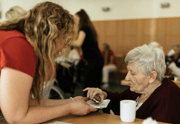
The holidays may sparkle with lights, laughter, and familiar songs, but not everyone feels that same festive glow.
For many older adults, this time of year can quietly stir up feelings of emptiness and disconnection.
Even as families gather and communities celebrate, countless seniors are navigating the season with a lingering sense of loneliness that few talk about.
Let’s take a closer look at how you can help yourself—or someone you love—find more comfort and connection this season.
The Hidden Epidemic: Loneliness Among Older Adults
Did you know?
The numbers paint a concerning picture of social isolation among older Americans. Approximately 28% of seniors live alone, totaling more than 14.7 million people—that's roughly 5 million men and 9.7 million women navigating daily life without regular companionship.
But here’s the twist: loneliness isn’t just about living solo. You can be surrounded by people and still feel isolated if you’re missing meaningful connections.
Loneliness can be a health risk. Research shows that chronic loneliness can be as harmful as smoking 15 cigarettes a day. It’s linked to higher rates of heart disease, stroke, anxiety, depression, and even dementia. In fact, the US Surgeon General recently called loneliness and isolation a public health crisis, with impacts that rival obesity and inactivity.
Here’s the good news: there are practical, proven ways to reconnect and rediscover joy, even if you’re feeling a little left out this season.
Four Ways to Add Connection to Your Holidays
1. Make Communication a Priority—All Year Long
Nothing beats a warm hug or a face-to-face chat. But if distance or health keeps you apart, don’t underestimate the power of a phone call, a video chat, or even a good old-fashioned letter. Set a weekly “connection date”—just 15-30 minutes to catch up, reminisce, or ask for advice.
Pro tip: Older adults have a treasure trove of stories and wisdom. Ask about their favorite holiday memory or what the world was like when they were your age!
And don’t wait for the holidays to reach out. Make it a habit in the new year, too. Encourage friends and family to join in—sometimes all it takes is a gentle nudge to remind someone they’re loved and remembered.
2. Tap Into Local Organizations and Community Spirit
Faith communities, senior centers, and libraries are bustling with opportunities for connection. Not religious? No problem! Many community centers offer everything from bingo nights to art classes. If your loved one is nervous about trying something new, offer to go with them the first time. Sometimes, a familiar face is all it takes to turn anxiety into excitement.
And don’t forget the power of giving back. Volunteering—whether it’s knitting blankets for a shelter, sorting food donations, or reading to children—can lift spirits and forge new friendships. Bonus: It’s a great way to make memories together.
Also read: Elderly woman’s Christmas note to restaurant staff leaves a lasting impact
3. Rediscover Hobbies (or Find a New One!)
What’s on your “menu” of interests? Whether it’s gardening, painting, reading, or playing cards, hobbies are a natural way to connect with others. Book clubs, knitting circles, and adult education classes are thriving both in person and online. Even solitary pursuits can become social with a little creativity—think virtual chess matches or sharing recipes in an online cooking group.
If you’re not sure where to start, ask about past hobbies or interests. Maybe it’s time to dust off that old guitar or try your hand at watercolor painting. And if you’re a whiz at something, consider teaching others—sharing your skills is a wonderful way to build community.
4. Have a Plan for the “In-Between” Times
Even with regular visits and activities, there will be quiet moments when loneliness creeps in. That’s when it helps to have a backup plan. For the tech-savvy, online support communities like Mental Health America’s forums are open 24/7. Prefer a friendly voice? The Friendship Line (1-800-971-0016) is a lifeline for adults 60+, offering conversation, support, and even crisis intervention, day or night.
And remember: it’s okay to ask for help. If you or a loved one is feeling persistently down or withdrawn, it might be more than loneliness. Mental Health America offers a free, confidential depression screening at MHAScreening.org—a great first step toward getting the support you deserve.
Also read: 16 festive ways seniors of all ability levels can celebrate the holiday season
Warning Signs That Professional Help May Be Needed
- Persistent withdrawal from previously enjoyed activities
- Changes in sleep patterns or appetite
- Expressions of hopelessness or worthlessness
- Increased use of alcohol or medications
- Talking about death or “being a burden”
- Neglecting personal care or home maintenance
Beyond the Holidays: Building a Year-Round Menu of Connection
The truth is, loneliness doesn’t keep a calendar. While the holidays can magnify feelings of isolation, these strategies work all year long. The key is to make connection a regular part of your routine—just like your morning coffee or evening walk.
Here are a few more ideas to spice up your social life:
- Start a “phone tree” with friends or neighbors—take turns checking in on each other.
- Organize a monthly potluck or game night (virtual or in-person).
- Join a walking group or exercise class—movement is good for the body and the soul.
- Try intergenerational activities—sharing stories or skills with younger folks can be incredibly rewarding.
Read next:
- Christmas made brighter: Celebrating joy and togetherness as a senior
- 10 powerful New Year’s resolutions every senior should know for a happier, healthier year
- Discover 14 unique winter holiday traditions you may have never heard of—which will you celebrate next?
Have you found creative ways to stay connected during the holidays? What hobbies or activities have brought you joy and new friendships? Or maybe you have a question about overcoming loneliness or supporting a loved one.






